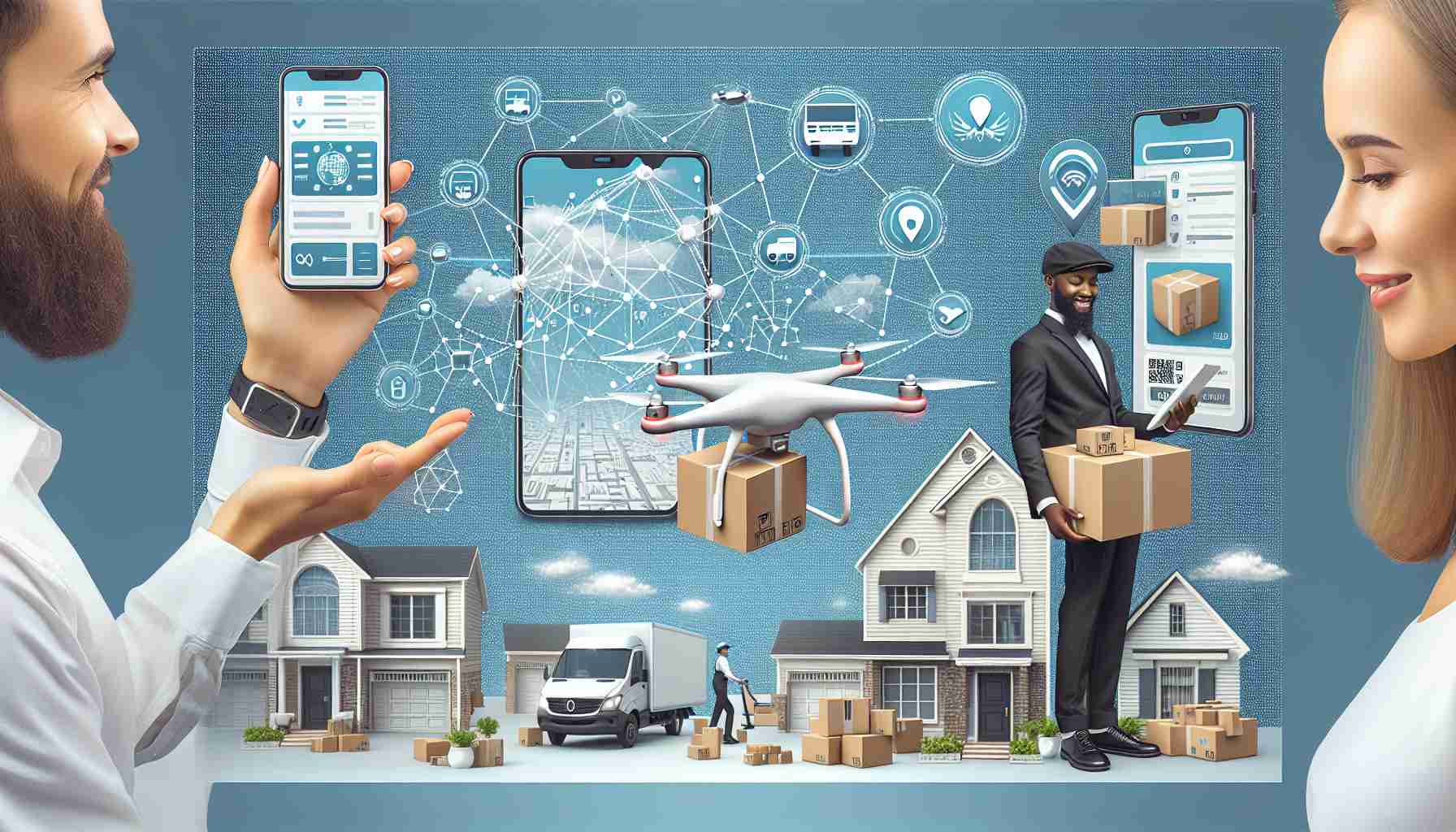In a fast-paced world where efficiency dictates success, the logistics industry is on the cusp of a groundbreaking transformation. The fusion of artificial intelligence (AI) and drone technology is set to redefine how products are delivered, potentially revolutionizing consumer interactions with the market.
AI: The Brain Behind Logistics
The role of AI in logistics transcends mere automation. Advanced algorithms are now essential in devising precise delivery schedules and streamlined routing strategies. This technological finesse not only minimizes human error but also ensures seamless adaptation to unforeseen circumstances, such as traffic disruptions or sudden weather changes. Moreover, AI-driven models are playing a pivotal role in promoting sustainable practices by crafting energy-efficient transportation solutions.
Drones: The New Delivery Heroes
Drones are quickly emerging as the champions of last-mile delivery, overcoming traditional logistical hurdles. Their ability to soar over congested streets and access remote areas is paving the way for unprecedented delivery speeds. As companies invest in building extensive drone fleets, the vision of reducing delivery times from days to hours is becoming a reality.
Embracing Challenges for a Tech-Driven Future
While regulatory and technological challenges persist, ongoing innovations are setting the stage for a new era in logistics. Enhanced drone navigation systems and collaborative efforts with regulatory bodies promise to mitigate existing barriers.
As the industry shifts towards these cutting-edge technologies, consumer expectations are being recalibrated. The logistics sector is not just on a path to becoming faster but is evolving into a more intelligent and interconnected network. This transformation holds the promise of not only setting new industry standards but also reshaping global trade dynamics.
The Intersection of AI and Drone Technology: Pioneering the Future of Logistics
The logistics industry stands at the precipice of a digital evolution, where artificial intelligence (AI) and drone technology converge to reshape the landscape of product delivery. This transformative wave promises to optimize efficiency, redefine consumer experiences, and drive substantial changes within the global economy. Let’s explore how this technological amalgamation affects the environment and humanity, and consider its implications for the future.
Impact on the Environment:
AI plays a crucial role in advancing sustainable practices within logistics. By deploying advanced algorithms, AI optimizes delivery routes to minimize emissions and conserve energy. Efficient routing reduces fuel consumption and minimizes the carbon footprint of transportation, presenting a significant opportunity to combat climate change. This green leap not only aligns with global environmental goals but also encourages other industries to adopt sustainable technologies, potentially catalyzing a larger movement towards environmental responsibility.
Moreover, drones, as a delivery solution, bring forth environmental benefits by replacing fuel-dependent vehicles with electrically operated machines. Their capacity to bypass traffic and navigate the shortest paths drastically reduces the overall distance traveled, contributing further to emission reductions. As drone fleets expand, the cumulative environmental impact could signal a decline in urban pollution and resource consumption.
Implications for Humanity:
The integration of AI and drones within logistics suggests a paradigm shift in accessibility and efficiency. By streamlining delivery processes, the technology promises unprecedented convenience for consumers, enhancing standards of living, especially in remote and underserved areas. With faster and more reliable delivery of essential goods—be it medications or fresh produce—communities can experience an uplift in health and socioeconomic opportunities.
However, the shift also poses challenges that humanity must address. The potential displacement of traditional logistics roles necessitates proactive strategies to upskill the workforce, ensuring economic stability and adaptability to new technology-driven roles. Additionally, ethical considerations related to privacy and surveillance from the widespread use of drones must be tackled with transparency and robust legal frameworks.
Economic Impact and Future Predictions:
Economically, the logistics industry’s transformation through AI and drones promises significant efficiency gains and cost savings, leading to lower consumer prices and increased market competitiveness. Businesses that embrace these technologies can pioneer new market segments and enhance their global reach, setting the stage for a fundamentally altered trade environment.
Looking to the future, the seamless integration of AI and drone capabilities could lead to the development of entirely autonomous logistics networks. These networks could operate round the clock, handling complex supply chains with minimal human intervention. As technology progresses, the potential for AI-driven logistical decision-making and drone-facilitated instant delivery could redefine commerce, instilling a new era of globalization.
In summary, the merger of AI and drone technology in logistics heralds a future rich with potential for environmental betterment, enhanced consumer convenience, and economic growth. However, it requires balancing innovation with ethical considerations and workforce adaptation to ensure a sustainable and inclusive technological future for humanity.
Revolutionizing Logistics: How AI and Drones are Shaping the Future of Delivery
Introduction
The logistics industry is experiencing a significant transformation as it embraces the integration of artificial intelligence (AI) and drone technology. These advancements promise to revolutionize product delivery, altering consumer interactions and setting new standards in the market. This article explores the latest innovations, implications, and future predictions in the realm of logistics powered by AI and drone technology.
AI’s Impact on Logistics Operations
AI is at the forefront of revolutionizing logistics operations by going beyond mere automation. Innovations in AI algorithms now enable more sophisticated planning and execution of delivery schedules, adapting dynamically to various real-time challenges like traffic and weather disruptions. This intelligence facilitates energy-efficient solutions, aligning logistics practices with sustainability goals.
Pros of AI in Logistics:
– Enhanced efficiency and accuracy in delivery planning.
– Ability to adapt to real-time changes, reducing delays.
– Contributions to sustainable practices and energy conservation.
Drones: Beyond the Horizon of Traditional Delivery
Drones have emerged as crucial players in overcoming the traditional barriers of last-mile delivery. They offer a significant advantage by bypassing congested roads, reaching remote locations quickly. These capabilities drastically reduce delivery times, evolving the expectation from days to mere hours, which aligns with the fast-paced demands of modern consumers.
How-To: Implementing Drone Delivery in Logistics
1. Assess Regulatory Requirements: Collaborate with regulatory bodies to ensure compliance and obtain necessary permits.
2. Invest in Technology: Equip drones with advanced navigation and obstacle detection systems.
3. Optimize Delivery Routes: Use AI to create efficient aerial routes for delivery.
4. Pilot Testing: Conduct extensive testing in controlled environments before full-scale deployment.
Challenges and Future Prospects
While challenges such as regulatory hurdles and technological limitations persist, ongoing innovations promise a brighter future. Collaborations between tech companies and regulatory authorities aim to address these challenges, paving the way for more extensive use of drones and AI in logistics.
Predictions for the Future:
– Increased investment in AI-driven drone technology by leading logistics companies.
– Enhanced drone delivery networks becoming a standard in urban and remote areas.
– Greater emphasis on sustainable practices within logistics.
Security and Safety Concerns
As drone technology becomes more prevalent, ensuring the security and safety of drone operations is critical. Innovations in cybersecurity measures and drone traffic management systems will be essential to protect against potential threats and ensure public safety.
Conclusion
The fusion of AI and drone technology is not only accelerating delivery speed but also cultivating a more intelligent and interconnected logistics network. This transformation carries the potential to redefine global trade and consumer expectations, setting new benchmarks for efficiency and sustainability in logistics.
Explore more about the future of logistics technology and AI advancements on IBM and Supply Chain 24/7.


















